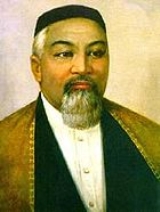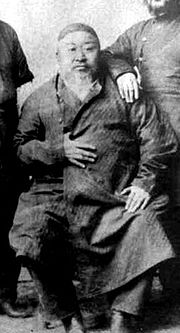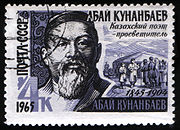
Abai Kunanbaiuli
Encyclopedia
Abay Qunanbayuli (August 10, 1845 - July 6, 1904) was a great Kazakh
poet, composer and philosopher. He was also a cultural reformer toward European and Russian cultures on the basis of enlightened Islam
.
 Abay was born on what is today the city of Karaul
Abay was born on what is today the city of Karaul
, in Abay District
, East Kazakhstan Province; the son of Qunanbay and Uljan, Qunanbay's second wife, they named him Ibrahim, but because of his brightness, he soon was given the nickname "Abay" (meaning "careful"), a name that stuck for the rest of his life. His father's economic status enabled the boy to attend a Russia
n school in his youth, but only after he had already spent some years studying at a madrasah
under Mullah
Ahmet Ryza. At his school in Semipalatinsk
, Abay encountered the writings of Mikhail Lermontov
and Alexander Pushkin.
and grew out of Kazakh folk culture. Before him, most Kazakh poetry was oral, echoing the nomad
ic habits of the people of the Kazakh steppe
s. During Abay's lifetime, however, a number of important socio-political and socio-economic changes occurred. Russian influence continued to grow in Kazakhstan
, resulting in greater educational possibilities as well as exposure to a number of different philosophies, whether Russian, Western or Asian. Abay Qunanbayuli steeped himself in the cultural and philosophical history of these newly-opened geographies. In this sense, Abay's creative poetry affected the philosophical thinking of educated Kazakhs.
 The leaders of the Alash Orda
The leaders of the Alash Orda
movement saw him as their inspiration and spiritual predecessor.
Contemporary Kazakh
images of Abay generally depict him in full traditional dress holding a dombra
(the Kazakh national instrument). Today, Kazakhs revere Abay as one of the first folk heroes to enter into the national consciousness of his people. Almaty State University is named after Abay, so is one of the main avenues in the city of Almaty. There are also public schools with his name.
The Kazakh city of Abay
is named after him.
Among Abay's students was his nephew, a historian, philosopher, and poet Shakarim Qudayberdiuli (1858–1931).
Statues of him have been erected in many cities of Kazakhstan, as well as in Moscow
.
A film on the life of Abay was made by Kazakhfilm in 1995, titled Abai. He is also the subject of two novels by Mukhtar Auezov
, another Kazakhstan writer.
, Johann Wolfgang von Goethe
, Lord Byron, Ivan Krylov
's Fables and Alexander Pushkin's Eugene Onegin
.
Abay's major work is The Book of Words , a philosophic treatise and collection of poems where he encourages his fellow Kazakhs to embrace education, literacy, and good moral character in order to escape poverty, enslavement and corruption. In Word Twenty Five, he discusses the importance of Russian culture, as a way for Kazakhs to the world's cultural treasures.
Kazakhs
The Kazakhs are a Turkic people of the northern parts of Central Asia ....
poet, composer and philosopher. He was also a cultural reformer toward European and Russian cultures on the basis of enlightened Islam
Islam
Islam . The most common are and . : Arabic pronunciation varies regionally. The first vowel ranges from ~~. The second vowel ranges from ~~~...
.
Early life and education

Karaul
Karaul is the name of several rural localities in Russia:*Karaul, Bogorodsky District, Kirov Oblast, a selo in Ukhtymsky Rural Okrug of Bogorodsky District of Kirov Oblast...
, in Abay District
Abay District, East Kazakhstan
Abay is a district of East Kazakhstan Province in eastern Kazakhstan. The administrative center of the district is Karauyl.-References:...
, East Kazakhstan Province; the son of Qunanbay and Uljan, Qunanbay's second wife, they named him Ibrahim, but because of his brightness, he soon was given the nickname "Abay" (meaning "careful"), a name that stuck for the rest of his life. His father's economic status enabled the boy to attend a Russia
Russia
Russia or , officially known as both Russia and the Russian Federation , is a country in northern Eurasia. It is a federal semi-presidential republic, comprising 83 federal subjects...
n school in his youth, but only after he had already spent some years studying at a madrasah
Madrasah
Madrasah is the Arabic word for any type of educational institution, whether secular or religious...
under Mullah
Mullah
Mullah is generally used to refer to a Muslim man, educated in Islamic theology and sacred law. The title, given to some Islamic clergy, is derived from the Arabic word مَوْلَى mawlā , meaning "vicar", "master" and "guardian"...
Ahmet Ryza. At his school in Semipalatinsk
Semey
Semey , formerly known as Semipalatinsk and Alash-kala , is a city in Kazakhstan, in the northeastern province of East Kazakhstan, near the border with Siberia, around north of Almaty, and southeast of the Russian city of Omsk, along the Irtysh River.-History:The first settlement was in 1718,...
, Abay encountered the writings of Mikhail Lermontov
Mikhail Lermontov
Mikhail Yuryevich Lermontov , a Russian Romantic writer, poet and painter, sometimes called "the poet of the Caucasus", became the most important Russian poet after Alexander Pushkin's death in 1837. Lermontov is considered the supreme poet of Russian literature alongside Pushkin and the greatest...
and Alexander Pushkin.
Contributions
Abay's main contribution to Kazakh culture and folklore lies in his poetry, which expresses great nationalismNationalism
Nationalism is a political ideology that involves a strong identification of a group of individuals with a political entity defined in national terms, i.e. a nation. In the 'modernist' image of the nation, it is nationalism that creates national identity. There are various definitions for what...
and grew out of Kazakh folk culture. Before him, most Kazakh poetry was oral, echoing the nomad
Nomad
Nomadic people , commonly known as itinerants in modern-day contexts, are communities of people who move from one place to another, rather than settling permanently in one location. There are an estimated 30-40 million nomads in the world. Many cultures have traditionally been nomadic, but...
ic habits of the people of the Kazakh steppe
Steppe
In physical geography, steppe is an ecoregion, in the montane grasslands and shrublands and temperate grasslands, savannas, and shrublands biomes, characterized by grassland plains without trees apart from those near rivers and lakes...
s. During Abay's lifetime, however, a number of important socio-political and socio-economic changes occurred. Russian influence continued to grow in Kazakhstan
Kazakhstan
Kazakhstan , officially the Republic of Kazakhstan, is a transcontinental country in Central Asia and Eastern Europe. Ranked as the ninth largest country in the world, it is also the world's largest landlocked country; its territory of is greater than Western Europe...
, resulting in greater educational possibilities as well as exposure to a number of different philosophies, whether Russian, Western or Asian. Abay Qunanbayuli steeped himself in the cultural and philosophical history of these newly-opened geographies. In this sense, Abay's creative poetry affected the philosophical thinking of educated Kazakhs.
Legacy

Alash Orda
Alash Orda was the name of the provisional Kazakh government between 13 December 1917 and 26 August 1920.The Alash Party proclaimed the autonomy of the Kazakh people in December 1917. Membership consists from 25 members and 15 member candidates...
movement saw him as their inspiration and spiritual predecessor.
Contemporary Kazakh
Kazakhs
The Kazakhs are a Turkic people of the northern parts of Central Asia ....
images of Abay generally depict him in full traditional dress holding a dombra
Dombra
The dombura is a long-necked lute popular in Central Asian nations...
(the Kazakh national instrument). Today, Kazakhs revere Abay as one of the first folk heroes to enter into the national consciousness of his people. Almaty State University is named after Abay, so is one of the main avenues in the city of Almaty. There are also public schools with his name.
The Kazakh city of Abay
Abay (city)
Abay is a city located in the nation of Kazakhstan, and has served as the capital of the Abay District, Karagandy Province since 2002....
is named after him.
Among Abay's students was his nephew, a historian, philosopher, and poet Shakarim Qudayberdiuli (1858–1931).
Statues of him have been erected in many cities of Kazakhstan, as well as in Moscow
Moscow
Moscow is the capital, the most populous city, and the most populous federal subject of Russia. The city is a major political, economic, cultural, scientific, religious, financial, educational, and transportation centre of Russia and the continent...
.
A film on the life of Abay was made by Kazakhfilm in 1995, titled Abai. He is also the subject of two novels by Mukhtar Auezov
Mukhtar Auezov
Mukhtar Omarkhanuli Auezov was a prominent Kazakh writer, known best for his work as a playwright.-Life:...
, another Kazakhstan writer.
Works
Abay also translated into Kazakh the works of Russian and European authors, mostly for the first time. Translations made by him include poems by Mikhail LermontovMikhail Lermontov
Mikhail Yuryevich Lermontov , a Russian Romantic writer, poet and painter, sometimes called "the poet of the Caucasus", became the most important Russian poet after Alexander Pushkin's death in 1837. Lermontov is considered the supreme poet of Russian literature alongside Pushkin and the greatest...
, Johann Wolfgang von Goethe
Johann Wolfgang von Goethe
Johann Wolfgang von Goethe was a German writer, pictorial artist, biologist, theoretical physicist, and polymath. He is considered the supreme genius of modern German literature. His works span the fields of poetry, drama, prose, philosophy, and science. His Faust has been called the greatest long...
, Lord Byron, Ivan Krylov
Ivan Krylov
Ivan Andreyevich Krylov is Russia's best known fabulist. While many of his earlier fables were loosely based on Aesop and Jean de La Fontaine, later fables were original work, often satirizing the incompetent bureaucracy that was stifling social progress in his time.-Life:Ivan Krylov was born in...
's Fables and Alexander Pushkin's Eugene Onegin
Eugene Onegin
Eugene Onegin is a novel in verse written by Alexander Pushkin.It is a classic of Russian literature, and its eponymous protagonist has served as the model for a number of Russian literary heroes . It was published in serial form between 1825 and 1832...
.
Abay's major work is The Book of Words , a philosophic treatise and collection of poems where he encourages his fellow Kazakhs to embrace education, literacy, and good moral character in order to escape poverty, enslavement and corruption. In Word Twenty Five, he discusses the importance of Russian culture, as a way for Kazakhs to the world's cultural treasures.

